AWM41 1003 - [Nurses Narratives] Ella McPherson
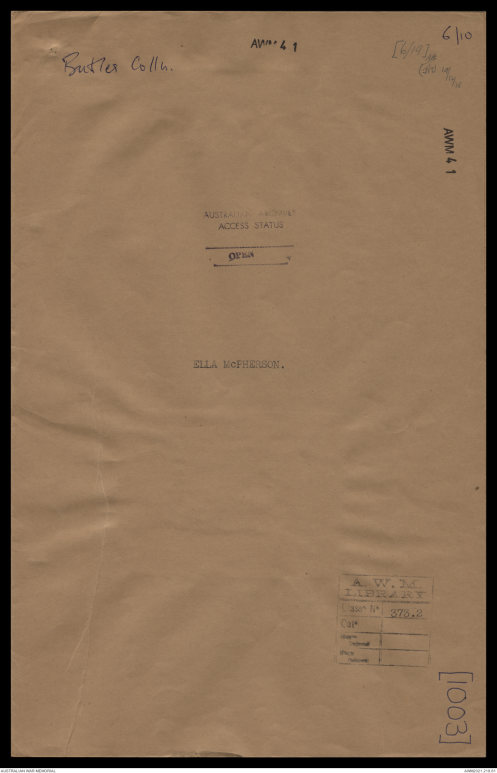
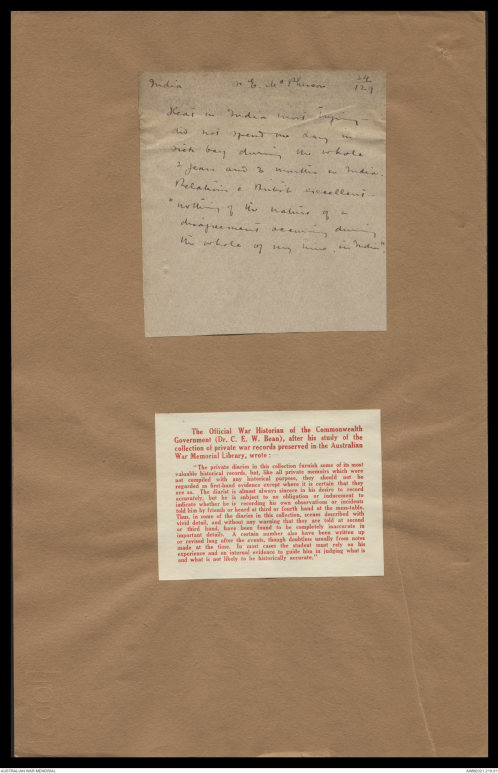
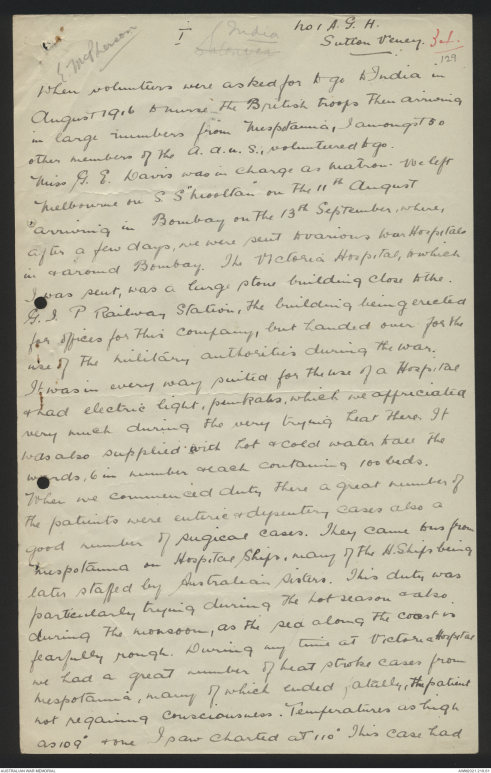
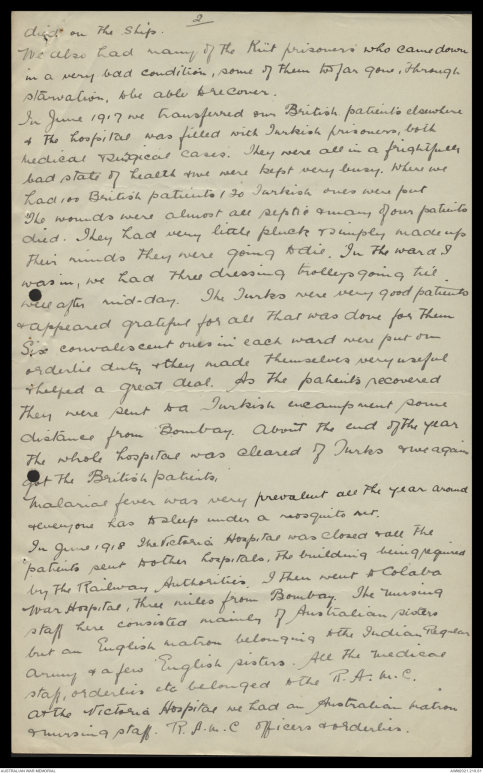
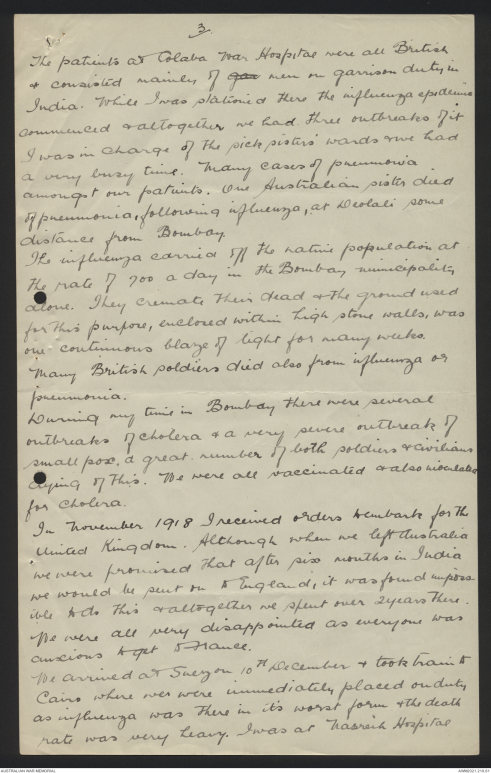
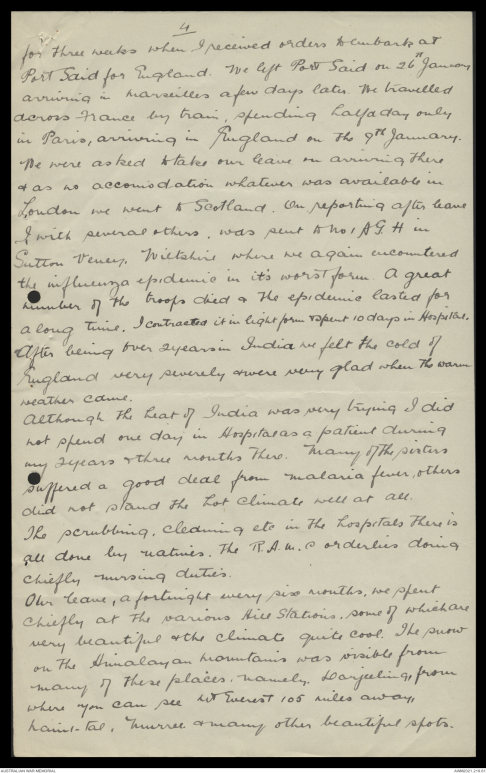
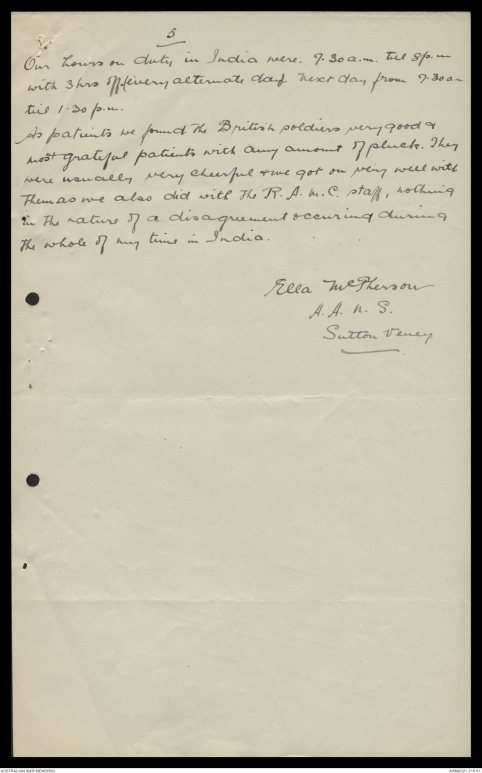
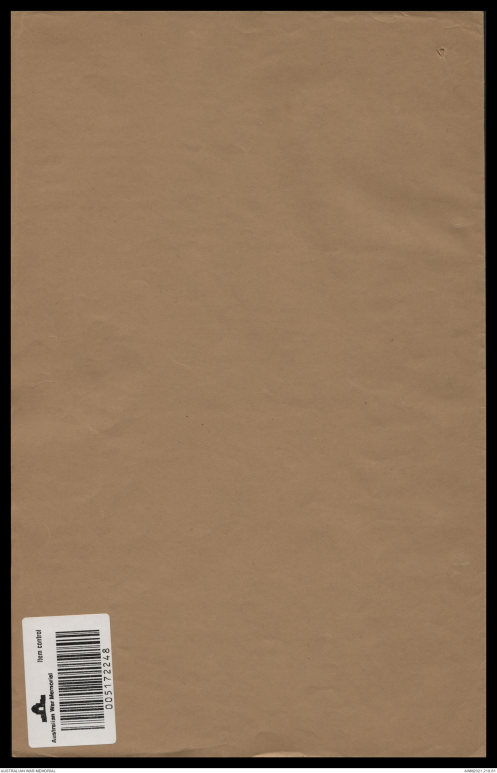
AWM41 6/10
[6/19]
[[?]]
AWM 41
Butler Colln
AUSTRALIAN ARCHIVES
ACCESS STATUS
OPEN
ELLA McPHERSON.
A.W.M
LIBRARY
Classn No 373.2
[1003]
India
Sr E. McPherson
24/129
Heat in India most trying -
did not spend one day in
sick bay during the whole
2 years and 3 months in India.
Relations w British excellent -
"nothing of the nature of a
disagreement occurring during
the whole of my time in India".
The Official War Historian of the Commonwealth
Government (Dr. C. E. W. Bean), after his study of the
collection of private war records preserved in the Australian
War Memorial Library, wrote:
"The private diaries in this collection furnish some of its most
valuable historical records, but, like all private memoirs which were
not compiled with any historical purpose, they should not be
regarded as first-hand evidence except where it is certain that they
are so. The diarist is almost always sincere in his desire to record
accurately, but he is subject to no obligation or inducement to
indicate whether he is recording his own observations or incidents
told him by friends or heard of third or fourth hand at the mess-table.
Then, in some of the diaries in this collection, scenes described with
vivid detail, and without any warning that they are told at second
or third hand, have been found to be completely inaccurate in
important details. A certain number also have been written up
or revised long after the events, though doubtless usually from notes
made at the time. In most cases the student must rely on his
experience and on internal evidence to guide him in judging what is
and what is not likely to be historically accurate,"
1
E McPherson
IndiaSalonica
No. 1 A.G.H.
Sutton Veney.
34/129
When volunteers were asked for to go to India in
August 1916 to nurse the British troops then arriving
in large numbers from Mesopotamia, I amongst 50
other members of the A.A.N.S., volunteered to go.
Miss G.E. Davis was in charge as Matron. We left
Melbourne on S.S "Mooltan" on the 11th August
arriving in Bombay on the 13th September, where,
after a few days, we were sent to various War Hospitals
in & around Bombay. The Victoria Hospital, to which
I was sent, was a large stone building close to the
G.I. P Railway Station, the building being erected
for offices for this company, but handed over for the
use of the military authorities during the war.
It was in every way suited for the use of a Hospital
& had electric light, punkahs, which we appreciated
very much during the very trying heat there. It
was also supplied with hot & cold water to all the
wards, 6 in number & each containing 100 beds.
When we commenced duty there a great number of
the patients were enteric & dysentery cases also a
good number of surgical cases. They came to us from
Mesopotamia on Hospital Ships, many of the H. Ships being
later staffed by Australian Sisters. This duty was
particularly trying during the hot season & also
during the monsoon, as the sea along the coast is
fearfully rough. During a time at Victoria Hospital
we had a great number of heat stroke cases from
Mesopotamia, many of which ended fatally, the patient
not regaining consciousness. Temperatures as high
as 109° & one I saw charted at 110° This case had
2
died on the ship.
We also had many of the Küt prisoners who came down
in a very bad condition, some of them too far gone, through
starvation, to be able to recover.
In June 1917 we transferred our British patients elsewhere
& the hospital was filled with Turkish prisoners, both
medical & surgical cases. They were all in a frightfully
bad state of health & we were kept very busy. Where we
had 100 British patients 120 Turkish ones were put
The wounds were almost all septic & many of our patients
died. They had very little pluck & simply made up
their minds they were going to die. In the ward I
was in, we had three dressing trolleys going till
well after mid-day. The Turks were very good patients
& appeared grateful for all that was done for them
Six convalescent ones in each ward were put on
orderlie duty & they made themselves very useful
& helped a great deal. As the patients recovered
they were sent to a Turkish encampment some
distance from Bombay. About the end of the year
the whole hospital was cleared of Turks & we again
got the British patients.
Malaria fever was very prevalent all the year around
& everyone has to sleep under a mosquito net.
In June, 1918 The Victoria Hospital was closed & all the
patients sent to other hospitals, the building being required
by the Railway Authorities. I then went to Colaba
War Hospital, three miles from Bombay. The nursing
staff here consisted mainly of Australian sisters
but an English matron belonging to the Indian Regular
Army & a few English sisters. All the medical
staff, orderlies etc belonged to the R.A.M.C.
At the Victoria Hospital we had an Australian matron
& nursing staff. R.A.M.C officers & orderlies.
3
The patients at Colaba War Hospital were all British
& consisted mainly of gar men on garrison duty in
India. While I was stationed there the influenza epidemic
commenced & altogether we had three outbreaks of it
I was in charge of the sick sisters' wards & we had
a very busy time. Many cases of pneumonia
amongst our patients. One Australian sister died
of pneumonia, following influenza, at Deolali some
distance from Bombay.
The influenza carried off the native population at
the rate of 700 a day in the Bombay municipality
alone. They cremate their dead & the ground used
for this purpose, enclosed within high stone walls, was
one continuous blaze of light for many weeks.
Many British soldiers died also from influenza or
pneumonia.
During my time in Bombay there were several
outbreaks of cholera & a very severe outbreak of
small pox, a great number of both soldiers & civilians
dying of this. We were all vaccinated & also inoculated
for cholera.
In November 1918 I received orders to embark for the
United Kingdom. Although when as left Australia
we were promised that after six months in India
would be sent on to England, it was found impossible
to do this & altogether I spent over 2 years there.
We were all very disappointed as everyone was
anxious to get to France.
We arrived at Suez on 10th December & took train to
Cairo where we were immediately placed on duty
as influenza was there in it's worst form & the death
rate was very heavy. I was at Nasrieh Hospital
4
for three weeks when I received order to embark at
Port Said for England. We left Port Said on 26th January
arriving in Marseilles a few days later. We travelled
across France by train, spending half a day only
in Paris, arriving in England on the 9th January.
We were asked to take our leave on arriving there
& as no accomodation whatever was available in
London we went to Scotland. On reporting after leave
I, with several others, was sent to No 1 A G. H in
Sutton Veney, Wiltshire where we again encountered
the influenza epidemic in it's worst form. A great
number of the troops died & the epidemic lasted for
a long time. I contracted it in light form & spent 10 days in Hospital.
After being over 2 years in India we felt the cold of
England very severely & were very glad when the warm
weather came.
Although the heat of India was very trying I did
not spend one day in Hospital as a patient during
my 2 years & three months there. Many of the sisters
suffered a good deal from malaria fever, others
did not stand the hot climate well at all.
The scrubbing, cleaning etc in the hospitals there is
all done by natives, the R.A.M.C orderlies doing
chiefly nursing duties.
Our leave, a fortnight every six months, we spent
chiefly at the various Hill Stations, some of which are
very beautiful & the climate quite cool. The snow
on the Himalayan mountains was visible from
many of these places, namely Darjeeling, from
where you can see Mt Everest 105 miles away,
Nainital, Murree & many other beautiful spots.
5
Our hours on duty in India were. 9.30 a.m. till 8 p.m
with 3 hrs off. (every alternate day) next day from 9.30 am
till 1.30 p.m.
As patients we found the British soldiers very good &
most grateful patients will any amount of pluck. They
were usually very cheerful & we got on very well with
them as we also did with the R.A.M.C. staff, nothing
in the nature of a disagreement occuring during
the whole of my time in India.
Ella McPherson
A.A.N.S
Sutton Veney
Australian War Memorial
Item control
005172248
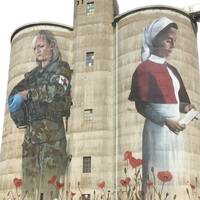 Jenny B
Jenny BThis transcription item is now locked to you for editing. To release the lock either Save your changes or Cancel.
This lock will be automatically released after 60 minutes of inactivity.